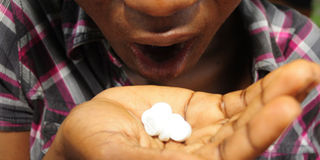Untreatable gonorrhea: How worried should we be?

According to experts, timely surveillance, appropriate antibiotic use, and treatment adherence remains the best defense against the development of antibiotic resistance in gonorrhea. FILE PHOTO
Specialists have indicated that Ugandans are vulnerable to the new and fast spreading untreatable strain of gonorrhea, urging the general population to practice safe sex.
The doctors’ warning comes on the heels of fears that the once treatable sexually transmitted infection (STI) could turn incurable after a man in the United Kingdom failed to respond to all the known alternatives of treatment for the disease.
The BBC news agency reported in March that a man in the UK had caught the world’s worst ever case of super-gonorrhea after a sexual encounter with a woman in South East Asia. The health officials also said it is the first time the infection cannot be cured with first choice antibiotics.
“This is the first time a case has displayed such high-level resistance to both of these drugs and to most other commonly used antibiotics,” Dr Gwenda Hughes, from Public Health England said in a BBC News interview.
Hard to detect
In Uganda, Dr Charles Kiggundu, a consultant gynaecologist and obstetrician at Kawempe Hospital, notes that there are several reasons for the local population to worry given the rampant misuse of antibiotics sold over the counter, which causes drug resistance.
“If you are already in a global village and let us say it (the disease) is not there, there is no guarantee that it is not yet here,” Dr Kiggundu says.
Dr Kiggundu also worries that it may also be hard for the resistant strain to be detected early with the kind of diagnosis used according the Ministry of Health guidelines where patients with STIs are treated depending on the presented symptoms as opposed to laboratory tests.
“It would take long to detect [the multi-drug resistant strain] and most laboratories in Uganda which have the capacity to diagnose are high class. May be by the time you discover it, it is late,” he warns, saying with the new development, both health workers and patients need to be more vigilant. If left untreated, Dr Kiggundu says the STI can be fatal since one would not be able to pass out urine or stool which would automatically cause death.
Symptoms
A patient with gonorrhea presents a very painful attack when passing out urine, which might force a man to yell, a typical symptom of gonorrhea, says Dr Kiggundu.
With time, the patient also develops pus-like discharge from the penis, testicles become swollen and very painful as well as swellings in the groin and pain in the abdomen, gynaecologitsts indicate.
The signs, although very quick to manifest in men, take longer to present in women and many may not notice them until they usually present a burning sensation when passing out urine, and experience pain during sexual intercourse. The other gonorrhea symptoms in women include abnormal vaginal discharge which may be yellowish in colour or bloody, vaginal bleeding and heavier menstrual bleeding.
Although the symptoms, in normal circumstances, are expected to go away shortly after treatment, certain strains of the gonorrhea bacteria have over time become resistant to some antibiotics, including quinolones, penicillin, tetracycline, and sulfa drugs. This means they can no longer be killed by the medicines that other alternatives are sought.
Interventions
The Ministry of Health in Uganda has however given assurance that with the improved laboratory facilities in regional hospitals, the country would ably manage the strain in case it strikes for as long as patients seek timely treatment at the right health facilities.
Dr Peter Tusiime, the in-charge of communicable diseases under which gonorrhea falls at the ministry says the regional laboratories in the country have the capacity to identify resistant strains and the drugs that can treat them.
“We are very well prepared to treat this because we have the capacity to diagnose the different germs resistant to drugs,” Dr Tusiime says, adding that the issue of drug resistance is increasing because people are using antibiotics rationally, resulting in resistance.
Caution
Dr Tusiime says gonorrhea prevalence in the country is not alarming except that there is still a problem of people engaging in unprotected sex, stressing the message of abstinence, being faithful, and using condoms.
“Other than the painful symptoms, gonorrhea is the major cause of infertility because the germs go to the fallopian tubes and even when they are treated, they leave scars,” Dr Tumusiime adds.
Different researches have indicated that drug resistance is more rampant in poorer areas of the world where antibiotics are sold over the counter hence the regulated use of antibiotics, leading to drug resistance.
Effects
According to the World Health Organisation, an estimated 78 million people newly contract the germ every year, which can hide in the genitals, rectum, and throat.
Many people carry gonorrhea without showing any noticeable signs, though symptoms include a green or yellow genital discharge, pain while urinating, and, for women, bleeding between periods.
If left untreated, gonorrhea can cause genital scarring and inflammation, infertility, and increased vulnerability to other sexually transmitted infections, such as HIV. If it’s passed from mother to child in the womb, it can also cause birth defects or miscarriage.




